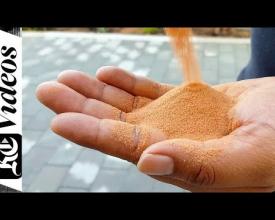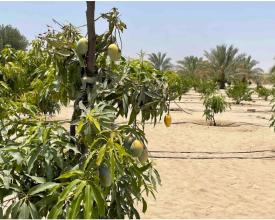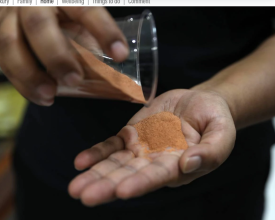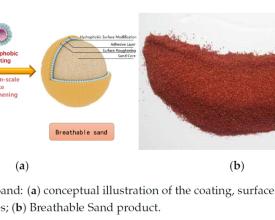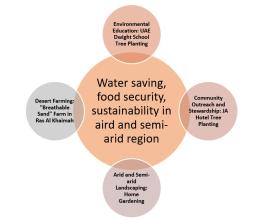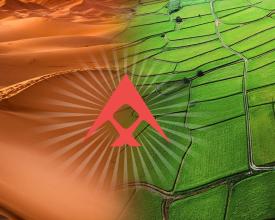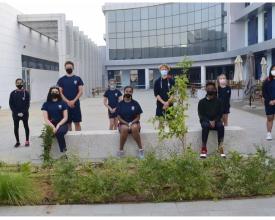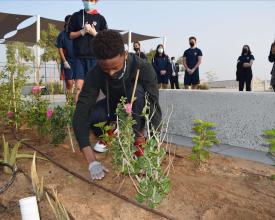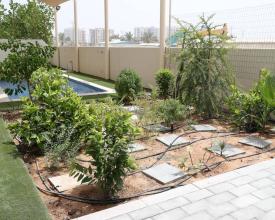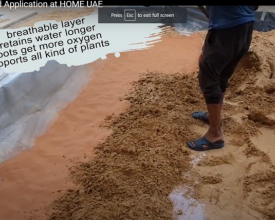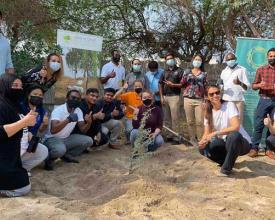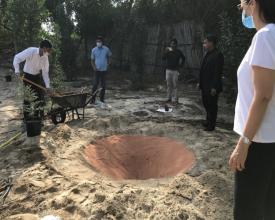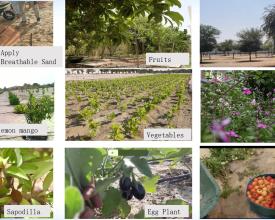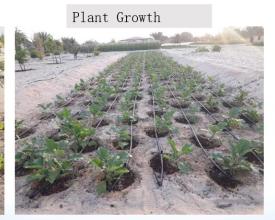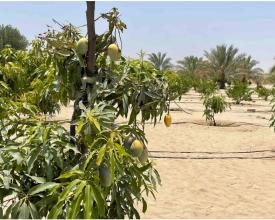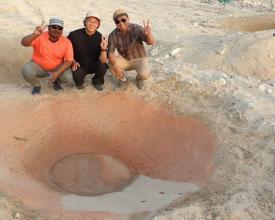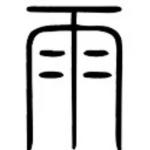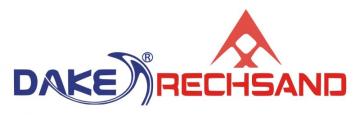
Utilize Treated Aeolian Sands to Combat Food Insecurity in Desert Regions
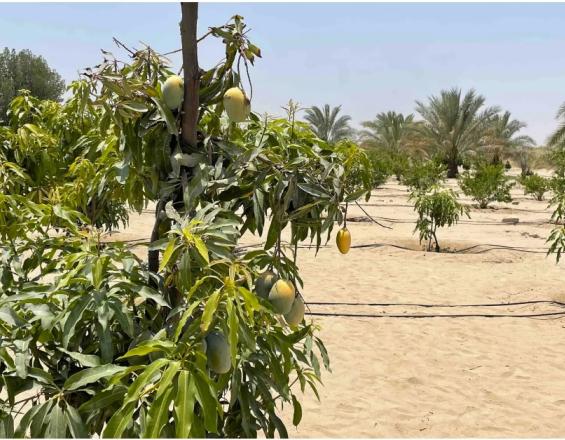
This solution is about sand-based technology to save irrigation water usage and reduce infiltration. Aeolian sands were sorted, washed, and then coated with water-repellency layers, and applied as a thin liner beneath the soil where the plants are rooted. It is a one-time application for many years, as long as the layer is not disturbed.
More than a dozen of projects in China have been completed since 2010, from reversing desertification to farming in barren lands. The size ranges from a few hectares to 100 hectares. A few projects in UAE were also completed in 2018, including a desert farm to combat food insecurity. Various fruits, crops, and vegetables are planted. People now can enjoy fresh local produces which was not available much before, and water usage can be reduced by up to 70-80%.
This technology won the Gold Award, in the “Innovation in Sustainable Technologies” category, at the Gulf Sustainability Awards in 2021.
Context
Challenges addressed
* Desertification becomes a global issue, with implications for biodiversity, eco-safety, poverty eradication, socio-economic stability, and sustainable development. As global temperatures rise and the human population expands, more lands are vulnerable to desertification.
* Water scarcity is worsened by climate change and increased water usage. Farming accounts for almost 70% of all water withdrawals. Agricultural water scarcity is expected to increase in more than 80% of the world’s croplands by 2050. 12 of the world’s 17 most water-scarce countries are in the Middle East and North Africa (MENA).
* Regional food insecurity: Food security is a big issue in many arid and semi-arid regions. MENA region is home to some of the largest net food importers in the world, importing over half of the calories they consume. One expert estimates that Middle East food imports could double from $35 to $70 billion by 2035.
Location
Process
Summary of the process
The foundation of all the building blocks in this solution is based on a solid core, the "Breathable Sand" technology, which treats the aeolian sands from the desert and applies them back to the desert environment, to save water and make farming sustainable.
The planting and demonstrations in schools, homes, and hotels, as well as in the successful desert farms, are all different application examples that pave the way for more sustainable activities in arid and semi-arid regions. The final goal is to change local people's activities and lives in arid and semi-arid regions, through innovative technologies which save more water, secure more local foods, and make farming more sustainable.
Building Blocks
Environmental Education: UAE Dwight School Tree Planting
Dwight School is a leading international school with campuses on three continents. In 2021, the Dubai campus has successfully used the water-wise and sustainable ‘Breathable Sand’ solution offered in water conservation and desert farming, as part of a tree planting drive on its campus.
This site also is used for education and demonstration purposes.
Enabling factors
* Tree planting using water-saving technologies is part of Dwight School's efforts. Good collaboration between the school and the sand technology firm is critical.
* External investment, support from key stakeholders, and initial in-kind donation are needed to donate sand to the school.
* With little guidance, middle-school-aged students can plan and implement the program mostly by themselves. We found training is still important which was provided by the sand scientists and school teachers prior to the tree-planting event.
Lesson learned
* No need to worry about the size of the project. School projects are small, but all gained lots of discussions among students and media. It also served as a demonstration site for visitors.
* Besides lessons in the classroom, students need hands-on experience in implementing breakthrough technologies.
* And the projects will continue to grow, as more students get interested in plant care and technologies that influence sustainability. Since the first project finished in Dwight School, there are more than a handful of local schools that have also used the same technology. Dwight School International has also expressed interest in buying the treated sands in larger projects on campuses in the USA.
Arid and Semi-arid Landscaping: Home Gardening
A temple tree, jasmine, a coconut tree, roses, and six varieties of hibiscus, are in full bloom in a home garden in Dubai, which don’t grow in the desert environment normally. Thanks to the "Breathable Sand" technology, water is saved and also plants grow healther.
Enabling factors
* A collaborative partnership between South Africa’s Dake Group and the Rechsand Technology Group from China was formed. The sand was partially donated from China, and the shipping and construction costs were covered by the Dake group. A common goal on the need for new sustainable technologies enables this collaboration.
Lesson learned
* Traning is needed even for small projects since this is a completely new technology for the region. An engineer from China has traveled to the site to ensure the correct installation.
Community Outreach and Stewardship: JA Hotel Tree Planting
Goumbook and JA Hotels & Resorts have planted a total of 20 Ghaf saplings in Dubai’s resort, backing the ‘Give a Ghaf’ campaign to conserve the threatened indigenous plant. Local hotel managers and employees planted trees using the new "Breathable Sand" technology to reduce irrigation water usage.
Enabling factors
* Initial contacts were started after a local green-technology conference, which allows Breatahbels Sand scientists/engineers to meet with the JA Hotel manager team.
* JA Hotels & Resorts is Dubai’s most sustainable 5-star resort. The partnership is forged by good collaboration and Hotel's need for new water-saving technologies. Some small demonstration sites (See School Tree Planting and Home Gardening building blocks) also provided confidence in JA Hotel in using this technology.
Lesson learned
JA Hotels & Resorts is Dubai’s most sustainable 5-star resort. The management team initially has some concerns about the tree performance using this new technology, since this is completely new to them. Good communication and other case studies were provided to JA Hotels which paved the way for the project's success, especially local case studies, and demonstration projects (see other building blocks).
Desert Farming: "Breathable Sand" Farm in Ras Al Khaimah
In Abu Dhabi, Breathable Sand technology has helped with the growing of peanuts, mung beans, and black-eyed peas on some farms, while mango and lemon orchids have also shown fruitful results in 18 months.
Most vegetables in Abu Dhabi are imported and/or shipped from nearby cities such as Dubai. Famers now can grow local vegetables and fruits to serve the local families. The quality of the product is also good, and the water usage is only 20% of what typical needs because uncontrolled infiltration is greatly reduced thanks to the Breathable Sand.
The current farm includes 500-square-meter arable land to plant vegetables and fruits, and 100,000 square meters of land in Ras Al Khaimah is being prepared for additional applications.
Enabling factors
* Local government was supportive to allow the farm built using the new water-saving technologies. This solution is also in-line with the food security needs in the region.
* Local farmers, after explanation and demonstrations (please see other building blocks), with little guidance, were happy to embrace the technology.
* After three of years of installation, high-quality produce and healthy plants are the best support to continue using the new technology.
Lesson learned
International collaboration is crucial in the initial implementation. The "Breatahbel Sand" technology was invented in China and was used in many applications. However, it is important to have on-site guidance to ensure the installation is done correctly. We found there are minor adjustments needed to fit the site-specific needs.
In addition, we realized that local manufacturing of the Breathable Sand is very important to reduce the shipping and transportation costs. UAE has abundant aeolian sand resources, which can be used to produce Breathable Sand locally. Building a sand-treatment and coating factory in UAE is planed for 2023 to reduce the costs.
Impacts
Thanks to the aeolian sand treatment technologies (hereinafter referred to as "Breathable Sand")
* A 500-square-meter desert farm was built to grow abundant and high-quality pulses, beans, tomatoes, chilies, mangoes, and lemons. A 100,00-square-meter farm is in the planning phase.
* A few sites including a handful of schools, home gardens, office buildings, and hotels were landscaped using this technology to save water;
* Reducing irrigation water usage by 70 to 80 percent in arid regions;
* Fewer fertilizers and pesticides are needed;
* Securing fresh local foods;
* Some sites are served for educational and outreach purposes.
After more than three years of implementation in UAE, good social, economic, and environmental benefits were gained.
Beneficiaries
Farmers saved up to 80% less water consumption; Residents buy fresh local foods and enjoy greener landscaping; Students and employees have stewardship and learning opportunities; Government increases regional food security

